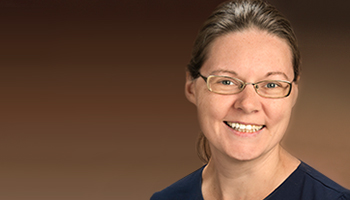HOW CAN WE HELP YOU? Call 1-800-TRY-CHOP
In This Section
CHOP Clinical Geneticist Wins Trio of Major Awards
 Elizabeth Bhoj, MD, PhD, modestly admits she had a May that most physicians dream of. The clinician-researcher in the at the Children’s Hospital of Philadelphia capped off the month by earning three major distinctions: the William K. Bowes Jr. Award in Medical Genetics, the Burroughs Wellcome Fund’s Career Awards for Medical Scientists with a $700,000 prize, and the Society for Pediatric Research’s (SPR) Physician Scientist Award.
Elizabeth Bhoj, MD, PhD, modestly admits she had a May that most physicians dream of. The clinician-researcher in the at the Children’s Hospital of Philadelphia capped off the month by earning three major distinctions: the William K. Bowes Jr. Award in Medical Genetics, the Burroughs Wellcome Fund’s Career Awards for Medical Scientists with a $700,000 prize, and the Society for Pediatric Research’s (SPR) Physician Scientist Award.
“Having this vote of confidence is even more important than the financial support,” Dr. Bhoj said. “Getting the feedback of, ‘Yes, we believe in you; this work has value, and it should continue,’ is an enormous career boost.”
Along with receiving the SPR award at the Pediatric Academic Societies Meeting in Toronto, she presented the lecture “Novel Gene Discovery in a Cohort of Patients with Craniofacial and Neurologic Syndromes” during the Presidential Scientific Plenary Session. Dr. Bhoj’s expertise lies in the field of translational genomics.
“A good percentage of children are suspected to have a genetic syndrome, but despite the best technology, the best technicians, the best everything, they still don’t get a diagnosis,” said Dr. Bhoj, who primarily covered two disorders in her talk. “And so, I really wanted to focus my research on those children.”
Dr. Bhoj first discussed TBCK-related intellectual disability and her team’s investigation into the gene that causes progressive pediatric neurodegenerative decline. They’ve made progress on the exact role of TBCK (TBC1-domain-containing kinase) in healthy people, and with this knowledge, they hope to work toward a targeted therapy for patients with the condition. They’re already exploring the benefits of a family of nutritional supplements.
Second, she reviewed some of her soon-to-be-published research on histone 3.3. Histones are proteins that wrap around DNA to keep it organized. Dr. Bhoj and colleagues found that a mutation in this particular histone is associated with a novel phenotype of developmental delay, neurodegeneration, epilepsy, and facial dysmorphism.
Through the discovery of new neurogenetic syndromes and, ideally, the development of therapies, Dr. Bhoj wants to provide answers to families who often struggle with the unknown or the guilt that they possibly did something wrong during pregnancy.
For example, she also recently played a key part in the CHOP team who discovered a new growth disorder, Mulchandani-Bhoj-Conlin Syndrome. Named in recognition of their work, the condition — characterized by failure to thrive, severe short stature, and profound feeding difficulties — is caused by an abnormality of chromosome 20.
“They know there’s something different about their child, but no one can tell them why — I want to be able to tell the family ‘the why,’” she said of her motivation. “Getting a diagnosis changes the whole way they see their child’s life going. It’s an important life-altering step for them.”
Even in cases where no interventions exist yet, these families now can join the appropriate support group, sign up for research studies, and learn more about the child’s prognosis, Dr. Bhoj noted.
“I want to give all those things to as many families as possible,” she said.